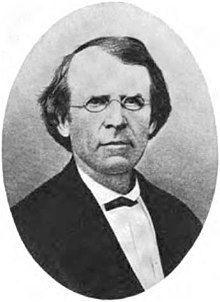Charles Henry Hardin | |
|---|---|
 | |
| 22nd Governor of Missouri | |
| In office January 12, 1875 – January 8, 1877 | |
| Lieutenant | Norman Jay Coleman |
| Preceded by | Silas Woodson |
| Succeeded by | John Smith Phelps |
| Missouri Senate 9th District | |
| In office 1860–1862 | |
| In office 1872–1874 | |
| Missouri House of Representatives | |
| In office 1852–1856 | |
| In office 1858–1860 | |
| Personal details | |
| Born | July 15, 1820 Trimble County, Kentucky, U.S. |
| Died | July 29, 1892 (aged 72) Mexico, Missouri, U.S. |
| Political party | Democratic |
| Education | Indiana University Bloomington Miami University |
| Profession | Lawyer |
| Signature | |
Charles Henry Hardin (July 15, 1820 – July 29, 1892) was an American attorney and politician who was Governor of Missouri served in the Missouri Senate and the Missouri House of Representatives.[1] He founded Hardin College and was one of the eight founders of Beta Theta Pi fraternity.[1]
Early life
[edit]In 1820, Charles Henry Hardin was born to Charles and Hannah Jewell Hardin in Trimble County, Kentucky.[1][2] Also in 1820, his family moved to Missouri and eventually settled in Columbia, Missouri.[3][4] Following his father's death in 1830, Hardin worked in the family's tannery business.[5]
Hardin began his secondary education in 1837 at the Indiana University Bloomington.[1] He transferred to Miami University in 1839 and graduated in 1841.[1][3] During his time at Miami University, he helped to found Beta Theta Pi fraternity.[5]
After college, he studied law with James M. Gordon in Columbia and passed the Bar.[1]
Career
[edit]Hardin opened a law practice in Fulton, Missouri in 1843.[3] From 1848 to 1852, he was a circuit attorney for the Second Judicial Circuit of Missouri.[1][3] He served in the Missouri House of Representatives, with terms starting in 1852, 1854, and 1858.[1] He was a Democrat.[1] He was a member of the commission that revised and codified the state's statute laws.[4]
In 1860, he was elected to the Missouri Senate 9th District, with a term lasting until 1862.[1][2] As a state senator, he attended Claiborne Fox Jackson's secessionist meeting in Neosho, Missouri and was the only senator present to vote against secession.[4]
During the Civil War, he returned to the family farm in Audrain County, Missouri in 1862.[3] After the war, Hardin and his family moved to Mexico, Missouri, where he established a new law practice and co-founded Mexico Southern Bank following the close of the war.[1][3]
In 1872, Hardin was again elected to the state senate for a term lasting until 1874.[1] In 1876, he was a delegate to the Democratic National Convention from Missouri.[2]
He ran for governor of Missouri and was elected on November 5, 1874.[1] He served as 22nd Governor of Missouri between January 1, 1875, and February 8, 1877.[1] During his term, a new constitution was approved.[1] Hardin also reduced Missouri's debt from the Civil War and state funding for railroad expansion by ending wasteful practices and refinancing bonds.[5]
Hardin established Hardin College and Conservatory of Music in Mexico, Missouri. In 1873, Hardin gave land worth $60,000 to the college and afterward served as the president of its board.[3][4]
Personal life
[edit]Hardin married Mary Barr Jenkins in 1844.[6][1]
Late in life, Hardin was in poor health.[4] In 1892, he died from conditions relating to old age in Ringo House in Mexico, Missouri.[2][4] He was initially buried in a private graveyard in Audrain County, Missouri, but was later re-buried at the Jewell family cemetery in Columbia, Missouri.[2][3]
Honors
[edit]Charles H. Hardin is the namesake of the small city of Hardin, Missouri.[7][8]
References
[edit]- ^ a b c d e f g h i j k l m n o p "Charles Henry Hardin". National Governors Association. January 8, 2017. Retrieved July 26, 2023.
- ^ a b c d e "Hardin Charles Henry". The Political Graveyard. Retrieved July 26, 2023.
- ^ a b c d e f g h "Passed Away. Death of Ex-Gov. Charles Henry Hardin of Missouri". Herald and Review. Decatur, Illinois. July 30, 1892. p. 1. Retrieved July 26, 2023 – via Newspapers.com.
- ^ a b c d e f "Ex-Gov. Hardin Dead". St. Louis Post-Dispatch. July 29, 1892. p. 4. Retrieved July 26, 2023 – via Newspapers.com.
- ^ a b c Heffernan Weil, Lisa (1999). Lawrence O. Christensen (ed.). Dictionary of Missouri Biography. Columbia, MO: University of Missouri Press. pp. 371–372.
- ^ "C0111 Hardin, Charles Henry (1820-1892), Papers, 1842-1892" (PDF). The State Historical Society of Missouri. Retrieved December 17, 2013.
- ^ Eaton, David Wolfe (1917). How Missouri Counties, Towns and Streams Were Named. The State Historical Society of Missouri. pp. 345.
- ^ Gannett, Henry (1905). The Origin of Certain Place Names in the United States. Govt. Print. Off. pp. 149.
